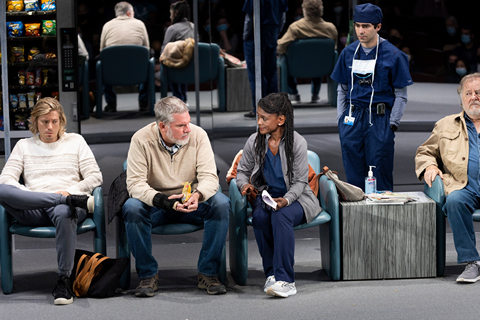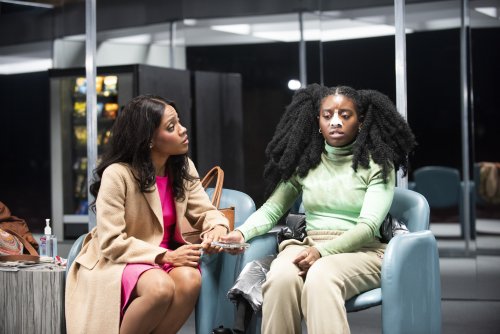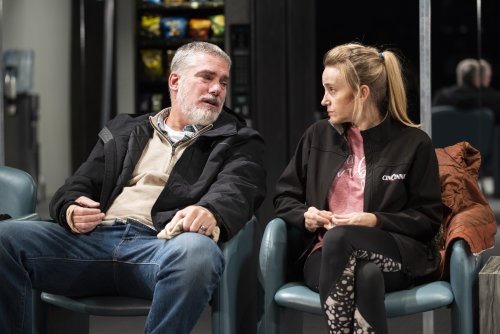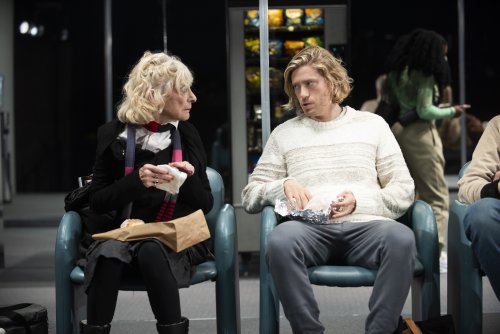I’m Revolting
A sensitive and perceptive play set in the waiting room of a private NYC skin cancer clinic introduces us to all walks of people and many reactions to medical reports.

Patrick Vaill, Glenn Fitzgerald, Patrice Johnson Chevannes, Bartley Booz and Peter Gerety in a scene from Gracie Gardner’s “I’m Revolting” at Atlantic Theater Company’s Linda Gross Theater (Photo credit: Ahron R. Foster)
[avatar user=”Victor Gluck” size=”96″ align=”left”] Victor Gluck, Editor-in-Chief[/avatar]
There are two truisms in life in addition to the one about death and taxes: it takes all kinds of people to make a world and something will get everyone in the end. The world premiere of Gracie Gardner’s I’m Revolting beautifully proves both points. A sensitive and perceptive play set in the waiting room of a private New York City skin cancer clinic, the play introduces us to all walks of people and many reactions to medical reports. The ensemble cast includes several veteran actors (Laura Esterman, Glenn Fitzgerald, Peter Gerety and Patrice Johnson Chevannes) and several not so well known faces. Knud Adams’ direction is subtle and unobtrusive allowing life to pass on the Linda Gross stage of the Atlantic Theater Company.
The title of I’m Revolting is a pun: patients worry about what they might look like after skin surgery and others stage their individual revolutions and refuse to take the doctors’ advice. The play covers one day the life of the clinic. We begin with Doctor Denise who has a terrific bedside manner given her line of work and her young resident Jonathan discussing the day’s events. Then various pairs of people arrive for their appointments, patients and their family members or caregivers. Ironically, the family members have more trouble accepting the diagnoses than the patients who generally accept what the doctors have to tell them.

Gabby Beans and Alicia Pilgrim in a scene from Gracie Gardner’s “I’m Revolting” at Atlantic Theater Company’s Linda Gross Theater (Photo credit: Ahron R. Foster)
First up is Reggie, a twenty-something, and her corporate executive sister Anna. Anna is the entitled type who challenges everything she is told, wants second opinions, and is not willing to take the doctor’s word for anything. Then there is the married couple, Liane and Jordan, who have come in from out of town and are on a limited budget. While Liane has been dealing with her condition for some time, her husband Jordan has more difficulty accepting the potential outcome. Next up is Toby who is still waiting for the result of his first tests and his officious mother Paula who is into holistic medicine and would prefer her son does not follow a traditional course of treatment. And finally there is Clyde who has been through this all before and is obstreperous, outspoken and blunt. In the course of the day, some patients disregard the doctors, others meekly follow their instructions; some caregivers abandon their charges, while others are called away to work. As in all waiting room plays, it is a cross-section of society.
The play is not depressing, except possibly to people who have gone through this kind of diagnosis and will suffer from déjà vu. Except for some band aids, we rarely see any evidence of the illnesses. However, as a character study of people in stressful situations, the play is fascinating in the way it unspools the various stories. Gardner’s ear for dialogue is right on target and the play develops naturally, with time gaps suggested by the lowering of the lights. The bland blue and grey set is soothing, though the mirrored back wall of the waiting room places the audience on stage too in Marsha Ginsberg’s stylized and attractive design.

Glenn Fitzgerald and Emily Cass McDonnell in a scene from Gracie Gardner’s “I’m Revolting” at Atlantic Theater Company’s Linda Gross Theater (Photo credit: Ahron R. Foster)
Adams’ direction, similar to that of his acclaimed work on English earlier this year, gets the most out of his actors and his staging is realistic and unfussy. As the head doctor, Chevannes speaks in the even tones of one who want to shows a little emotion and is trying to be as clear as possible. As her assistant, Bartley Booz show by his body language that he is still working through the tension inherent in the job. In the story that is given the most time, Alicia Pilgrim is very real as the young lady who worries about being disfigured before she has had a chance to live her life and her final decision is made with this in mind. As her older sister, Gabby Beans is highly amusing as an entitled woman who always thinks she is being cheated – until after she does the research herself.
Glenn Fitzgerald and Emily Cass McDonnell as Jordan and Liane are a striking contrast, suggesting that their marriage has been on the rocks for some time, possibly due to her condition. It is he who puts up more of a fuss than his wife who is resigned to her diagnosis. In her usual incisive style, Laura Esterman creates a mother entirely mistaken about the treatment her son needs, while Patrick Vaill as the son makes his years of living under his mother’s thumb as well as his exasperation quite clear without stating the case. As a seemingly crass loud-mouth, Peter Gerety is ultimately the hero letting the misguided understand what they need to know from his personal experience dealing with recurring skin cancer. Though they are mostly playing people who have not met before, the nine actors make a fine cohesive ensemble in ways that strangers thrown together for long periods of time often do.

Laura Esterman and Patrick Vaill in a scene from Gracie Gardner’s “I’m Revolting” at Atlantic Theater Company’s Linda Gross Theater (Photo credit: Ahron R. Foster)
Enver Chakartash’s costumes in various colors and styles define the characters as soon as we meet them. The bright lighting by Kate McGee is periodically replaced by dimming lights to represent the passage of time from morning till evening. As directed by Knud Adams, Gracie Gardner’s I’m Revolting is both engrossing and enlightening as we watch how various people deal with unpleasant news that we all may have to hear some day.
I’m Revolting (through October 16, 2022)
Atlantic Theater Company
Linda Gross Theater, 336 W. 20th Street, in Manhattan
For tickets, call 646-989-7996 or visit http://www.atlantictheater.org
Running time: 95 minutes without an intermission






Leave a comment